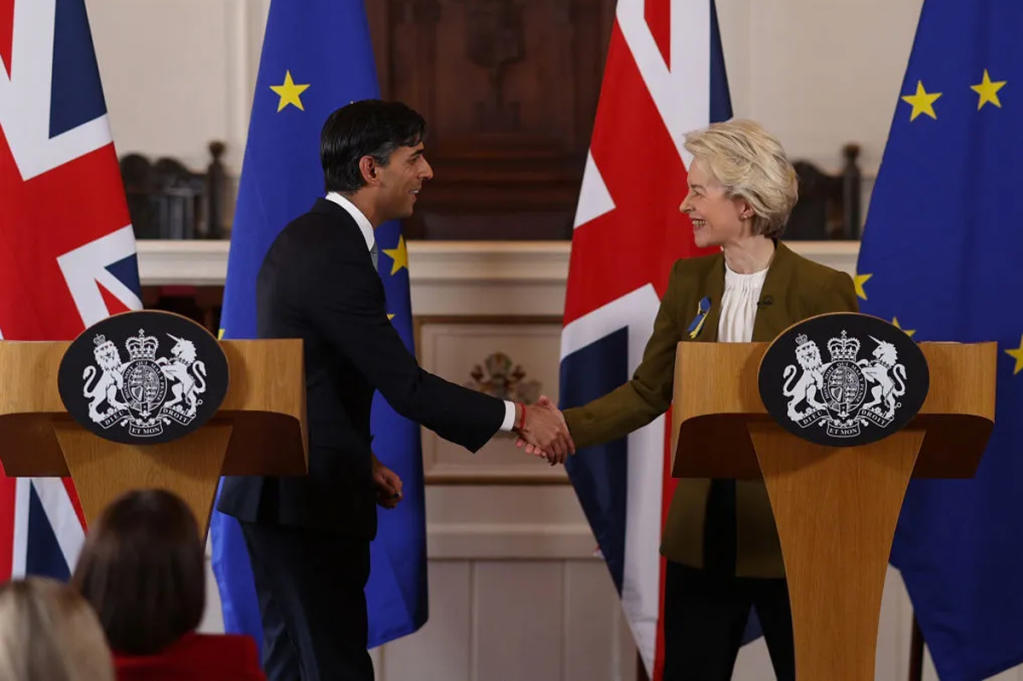Rishi Sunak’s UK government has succeeded in renegotiating the Northern Ireland Protocol, despite European Union insistence that this could not and would not be done. That there is a Windsor Framework is proof of that. A new geopolitical reality in Europe required Western unity, it is true, but there was more than that.
The UK found a way to persuade the EU of the moral, political and legal case for a renegotiation — overturning the significant moral, political and legal impediments that held the EU back from any “renegotiation.” This was due to an intellectual transformation of the understanding of the relationship of the Good Friday Agreement and the Protocol — one promoted by the UK rather than Ireland.
Instead of the intellectual arguments being lost, as they had been in late 2017, culminating in the UK commitment to alignment of Northern Ireland with large swathes of the EU’s acquis, the UK was able to seriously challenge the EU’s position by demonstrating the inherent weaknesses in the intellectual basis upon which its position was built. Crucially, the UK could show that the collapse in Northern Ireland’s institutions was not solely a UK problem but represented a systemic threat to the whole basis of the Protocol and indeed to the EU’s own mandate for the negotiations (as was established in a series of authoritative Policy Exchange reports by the last UK Noble Peace Prize laureate David Trimble, among others).
With so much of the EU’s position hinging on the Good Friday Agreement, the UK was able to establish its authority as the sovereign government under the associated British-Irish Agreement of 1998 and to conduct its own pedagogic exercise about what the agreement entailed — something it had failed to achieve in 2017/18.
Equally crucially, the EU was brought to see that the breakdown in Northern Ireland’s institutions as a consequence of the collapse of the constitutional consensus required serious attention and justified renegotiation. It was this new-found intellectual confidence that allowed the Northern Ireland Protocol Bill to be put on the shelf. The Bill may have helped to bring the EU to the negotiating table, but it was the winning of the intellectual, moral and legal arguments that has allowed Sunak to guide the negotiations to safe harbor.
In consequence, the UK has been able to turn a position that appeared morally, politically and legally weak, into a position that is morally, politically and legally strong — and has been able to negotiate on terms that have the utmost integrity.
The Windsor framework has re-established the UK’s internal market for goods in Northern Ireland and minimized the application of EU law to the bare minimum required to avoid a hard border and allow NI goods to circulate freely in the EU internal market. The democratic deficit — the fear of effective rule from Brussels — has not only been addressed by adding the Stormont Lock to the requirement for a consent vote in just over eighteen months, but there will be significant consultation on both EU and UK legislative changes that might lead to divergence.
Not only that, but EU law is not imposed on Northern Ireland but limited to its business sector which as a consequence has access to the EU’s internal market on almost the same terms as members of the EU. This application of EU law to non-member states is the same trade off that Norway and Switzerland have accepted, but with much less EU law applied in practice.
Though some members of the Democratic Unionist Party have argued that the key test is the removal of all EU law from application in Northern Ireland, this does not appear in any of Sir Jeffrey Donaldson’s seven tests that he set out in the summer of 2021. There was a reason that this was not included: it could not be achieved, and the key criteria for the seven tests was that they could be met. Those tests have now been met, by any fair reading. This renegotiation represents the restoration of the UK’s diplomatic reputation after the debacle of Theresa May’s December 2017 Joint Report and the failure to recover that followed it.
This article was originally published on The Spectator’s UK website.

























